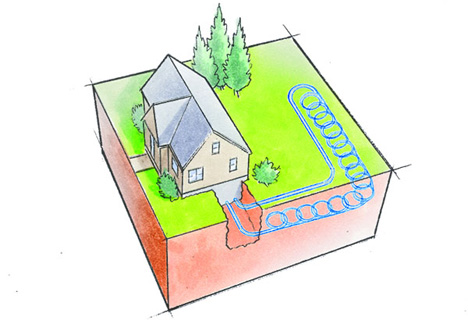Every time I write about ground source heat pumps, (like in my post Blowing Hot and Cold on Ground Source Heat Pumps) the commenters are enraged, saying ” If I were a geothermal contractor or manufacturer I would have asked that this be removed for falsely conveying what geothermal has to offer ” and “engineering degree would probably help too.”
But I just got my licence to practice architecture thirty years ago this month and obviously don’t know what I am talking about, so it is great to find a real expert, like Alex Wilson at Green Building Advisor, saying much the same thing.
Right off the bat I am excited about his post, for he agrees with me about calling them ground source heat pumps instead of geothermal. (and if you want to see more people calling me an idiot, read the comments at Jargon Watch: Geothermal vs Ground Source Heat Pump) Alex writes:
A ground-source heat pump (GSHP) is also referred to as a “geothermal” heat pump, though I prefer the former terminology, to avoid confusion with true geothermal energy systems that rely on elevated temperatures deep underground from the Earth’s mantle.
After that he could sell me on vinyl replacement windows, let alone GSHPs. Instead he goes on to point out:
They are rarely as efficient as promised; they advertise a Coefficient of Performance of 3.5 times that of straight resistance electric heating, but turn out to be around 2.5. (John Straube at Buildingscience.com notes that the COP rated efficiency may not include the energy required for the pump, suggesting that “This electrical energy can be significant, particularly if the loop is long, the pipes are small, or the flow resistance within the heat pump unit is large.” That may account for the difference.)
Alex also notes that the GSHPs run on electricity, which for much of America comes from coal; if you go back to the source, efficiency the numbers are a lot lower. If you care about your carbon footprint, it is actually worse than running on natural gas.a commenter did the numbers:
1. Burn natural gas at 92% efficiency = 1.09 MMBtu of fuel which makes 130 lb CO2.
2. Burn #2 fuel oil at 83% efficiency = 1.2 MMBtu and 175 lb CO2
3. Run a ground-source heat pump and purchase 0.33 MMBtu of electricity which has made 140 lb CO2.
These numbers do not apply if you live in Quebec or parts of the Continent where you can purchase green energy from hydro or renewables.
But ultimately, Alex’s objection is the same as mine: they are really expensive and there are better places to spend your money.
The reason I’m not a huge proponent of GSHPs is that they’re really expensive. Most of the expense is due to the cost of digging trenches and laying tubing….It is not unusual to hear about GSHPs in Vermont costing as much as $35,000 for typical homes. For the same investment, one could spend $30,000 reducing heating loads (insulating, air sealing, replacing windows, etc.) and install a state-of-the-art mini-split heat pump.
Not only does natural gas have a lower carbon footprint than a coal-fired GSHP, but America is awash in the stuff, so much so that they are thinking of reversing the flow in the pipelines and exporting it to Canada. The development of shale gas in the States changes everything, and anyone who says that you are going to get a return on investment by switching your heating from gas to electricity is basically lying.
We need to invest in reducing our consumption, not in buying green gizmos. That is why I am so enamoured of Passivhaus design. There, the technology is simple: add a shitload of insulation and eliminate leaks. Reduce demand rather than switching supply. That is the path to energy independence and a lower carbon footprint.
Read it all at Green Building Advisor
See also John Straube at Buildingscience.com and the always controversial Henry Gifford’s post Ground-Source Heat Pumps Don’t Save Energy
http://www.treehugger.com/files/2010/02/are-ground-source-heat-pumps-good.php

